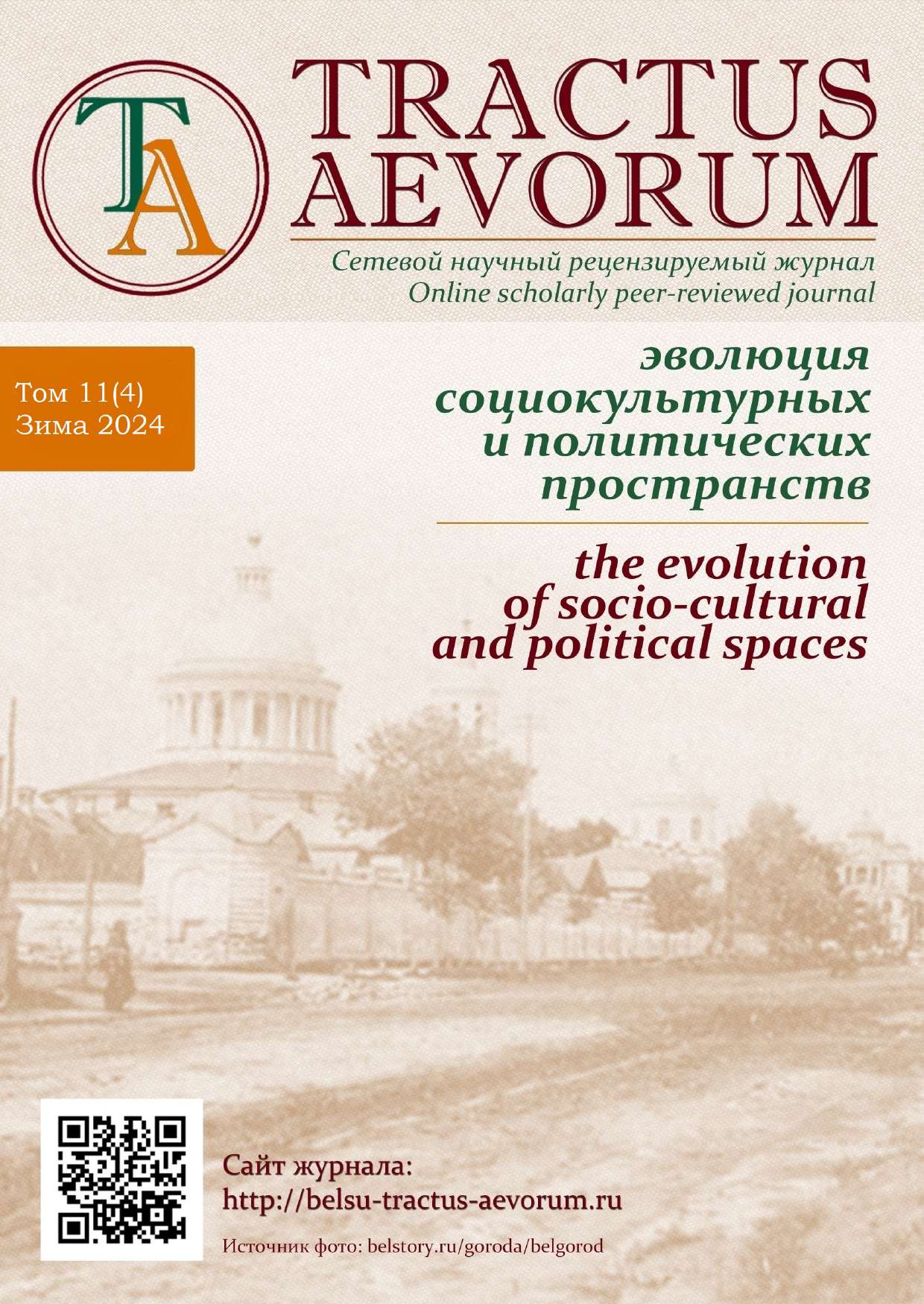|
DISCUSSION CLUB
|
Soviet and Post-Soviet Russian environmental history: analytical review
|
  |
Original article
Yevgenia М. Lupanova
Peter the Great’s Museum for Anthropology and Ethnography (Кunstkamerа) Russian Academy of Sciences
3 Universiteskaya emb., St. Petersburg, 199034, Russia
E-mail:
This e-mail address is being protected from spambots. You need JavaScript enabled to view it
Abstract. The analytical and polemical article is the result of many years historiographical study. Many modern researchers self-characterized as environmental historians are inherently state-legal, continuing a tradition that was considered obsolete already a century ago. This trend is a striking, but not the only symptom of the global crisis that environmental history is currently experiencing. The most important one is the lack of a unified and universally recognized research field and methodological principles. It seems that the Russian tradition of studying the interaction of man and the natural environment is a reliable basis for overcoming the current situation.
Keywords: general scientific research principles, historiography, environmental history, crisis, pluralism, amorphousness of the research subject field, humanities, prospects for overcoming the crisis.
DOI: 10.18413/2312-3044-2024-11-4-305-322
|
Socio-political portrait of the leaders of the united nobility
|
  |
Original article
Ekaterina P. Barinova
Samara University
34 Moscow Hw., Samara, 443086, Russia
E-mail:
This e-mail address is being protected from spambots. You need JavaScript enabled to view it
Igor O. Trubitszyn
Togliatti State University
14 Belorusskaya St, Tolyatti, 445020, Russia
E-mail:
This e-mail address is being protected from spambots. You need JavaScript enabled to view it
Abstract. Based on the analysis of biographical materials, office documentation and periodicals, the article presents a socio-political portrait of the members of the first composition of the Permanent Council of the United Noble Societies. It is noted that the process of creating a united noble organization, its role and the influence of the Permanent Council on the political situation during the years of the first Russian revolution are the subject of discussions in domestic and foreign historiography. The process of organizational development of the united noble organization is shown, the degree of participation of individual members of the corporation in its creation is characterized. It is noted that the members of the Permanent Council included large and medium-sized landowners-nobles, who were united not only by common conservative views and the desire to improve the position of the noble class, but also by active work in zemstvo bodies and corporate organizations. It is emphasized that the Permanent Council of the United Nobility included those nobles who possessed impeccable moral qualities and were the expression of the interests of the conservative nobility.
Keywords: Permanent Council, nobility, historiography, leader of the nobility.
DOI: 10.18413/2312-3044-2024-11-4-323-336
EMPIRE AND PERIPHERY
|
To the Issue of the Number of Nomads in the Steppe Zone of the Crimea at the turn of the 4th – 5th Centuries A.D.
|
  |
Original article
Artem A. Vnukov
Leo Tolstoy Tula State Pedagogical University
125 Lenin av., Tula, 300026, Russia
E-mail:
This e-mail address is being protected from spambots. You need JavaScript enabled to view it
Abstract. This article, which raises the question of correlating the available ideas about the number of nomads of the Hunnic Circle, is presented by the author as the first part of a series of future studies to determine the military contingent of nomads in Eastern Europe. To solve the task, the author divides the territory of the steppe zone of Eastern Europe into three areas. They correspond to the historiographic representation of the Huns' settlement at the second stage of their history. This article is devoted to the study of the number of nomads of the Hunnish time in the steppe zone of Crimea as part of the allocated “Akatsir” zone and the most important for annual grazing. Based on the analysis of written and archaeological sources, the author distinguishes three waves of Hun migration to the steppe Crimea: the first corresponds to the Alpidzuras; the second - to the Akatsirs; the third - corresponds to the “royal” Huns, whose appearance in the steppe Crimea should be associated with the events of the Hun-Akatsir conflict in 447. On the basis of this selection, the author concludes that for the last quarter of the 4th - 5th centuries A.D. in the available calculations it is necessary to make a correlation, because for the nomads migrating to the region, the Crimean winter pastures became year-round for several decades, until the situation in the North-Black Sea steppes finally improved. Within two decades, the alpidzurs resumed their farming. However, it is unknown whether or not they joined the confederation of the Akatsirs at the beginning of the fifth century.
Keywords: nomads, Huns, Great Migration of Peoples, pastures, archaeology, Hun time, post-Gun time.
Acknowledgments: The study was carried out at the expense of a grant from the Russian Science Foundation 23-28-01665 "Ethnocultural interaction in the ethnocontact zone of the Eastern Crimea in the first half of the I millennium AD."
DOI: 10.18413/2312-3044-2024-11-4-337-347
|
«Rare goods from high mountains or distant Seas»: what «The Tale of the Bracelet» says about Roman trade with India
|
  |
Original article
Nikita V. Vasilkov
Belgorod State National Research University
85 Pobedy st, Belgorod, 308007, Russia
E-mail:
This e-mail address is being protected from spambots. You need JavaScript enabled to view it
Abstract. The article analyses the reflection of Indo-Roman trade in “The Śilappadikāram” by Ilango Adigal, who described in detail the life of Puhar and Madura, which were important trading centres of South India in the 2nd century AD. The article examines peculiarities of Roman residence in South India, some details of the trade process and storage of goods, as well as the differences in the nature of trade in these cities. Special attention is paid to the question of the origin of the Yavana warriors in Madura and to the excerpt in which Raoul McLaughlin had seen evidence of ships being sent to the Roman Empire.
Keywords: Indo-Roman trade, Sangam literature, Yavanas, Tamils.
DOI: 10.18413/2312-3044-2024-11-4-348-359
CAREERS AND DESTINIES
|
Professional development of V.A. Milyutin and his activities in the Russian Geographical Society in 1848 –1855
|
  |
Original article
Iuliia O. Mashukova
National Research University ‘Higher School of Economics’
20 Myasnitskaya st., Moscow, 101000, Russia
E-mail:
This e-mail address is being protected from spambots. You need JavaScript enabled to view it
Аннотация. This article explores the professional development of Vladimir Alekseyevich Miliutin (the younger brother of Dmitry and Nikolai Miliutins). It examines his activities as a member of the Imperial Russian Geographical Society, one of the few official institutions in the public sphere of the Russian Empire, from 1848 to 1855. The sources analyzed in the article allow the author to trace the influence of family experience on the formation of his personality and his subsequent career.
Keywords: V.A. Miliutin, Great Reforms, Russian Geographical Society, "enlightened bureaucrats".
DOI: 10.18413/2312-3044-2024-11-4-360-373
VISUAL HISTORY
|
«Two Worlds, two ways of life»: political poster as a tool for shaping the worldview of Soviet citizens
|
  |
Original article
Galina A. Gladkova
Ryazan State University named after S.A. Yesenin
46 Svobody st., Ryazan, 390000, Russia
E-mail:
This e-mail address is being protected from spambots. You need JavaScript enabled to view it
Abstract. The author sets out to explore the political poster as a tool for shaping the worldview of Soviet citizens. The chronological framework of the study covers the years 1940-1970. The article identifies the main methods of forming the image of Soviet and Western society, which was represented by the Soviet poster, and identifies the main features of these images. The author concludes that the conscious use of the most understandable forms of text presentation and vivid illustrations on the Soviet poster helped to draw in the public consciousness the horror of life in the capitalist West and the advantage of the Soviet system.
Keywords: image, bipolar world, Soviet propaganda, Soviet poster.
DOI: 10.18413/2312-3044-2024-11-4-374-389
|



